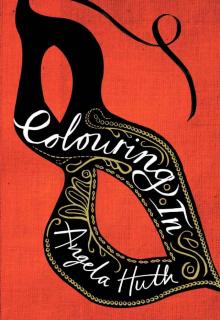- Home
- Angela Huth
Monday Lunch in Fairyland and Other Stories Page 12
Monday Lunch in Fairyland and Other Stories Read online
Page 12
It was raining when she woke. Alice was immediately glad. She liked grey days better than bright ones. Her own internal yellow illumined the hours more satisfactorily when there was no real sun outside to compete with. Besides, there was more to do on rainy days. The lulling pleasure of sweeping and re-sweeping the kitchen floor, and the hall carpet where they all forgot to wipe their shoes. She sprang out of bed, looking forward to the day. Gently pulled back the curtains so as not to wake Jack for another ten minutes.
‘I’ve written the letter,’ he said. ‘I trust you’ve come to your senses, so I’ll be posting it this morning.’
Alice stood still by the window, a bunch of curtain hitched up in her hand, staring at the rain. She wriggled her toes in the warm burrows of her slippers.
‘You can post the letter,’ she said, ‘but I’ve not changed my mind. I’m not going.’
Jack sighed. He threw back the bedclothes, sat up, slinging his legs on the floor, knees left wide to support his arms. His hands cradled his head.
‘You’re barmy,’ he said. ‘What’s your objection?’
Alice was going to say the lavatory, the spilling bin, the potato peelings, the water rats – but it was none of those things, individually, or even together. What was her objection, she asked herself?
‘Nothing in particular I could explain,’ she said. Any more than she could explain how her body felt when it was drained of yellow. They’d think she was mad.
‘You’re barmy,’ Jack said again. ‘What you need is a tonic, too. A change. You don’t look after yourself all that much.’
‘Oh, I’m fine,’ said Alice. ‘I’ll be getting the breakfast.’
And the strange thing was, getting the breakfast, she felt just as usual: the same subdued pleasure, a lovely saffron colour at this time of day, soon to flower later into the inevitable chrome. It was only when she let her mind alight on the holiday that the warmth of the colour in her veins ebbed from her. So she tried not to think. That wasn’t easy, considering how the others kept on with their remarks. Then Jack gave her a strange look as he left.
‘I’ll be posting the letter,’ he said.
For three evenings they tried to persuade her to change her mind. She resisted, simply, strongly. Nothing they could say would alter what she felt: she didn’t want to go. Then what did she want to do, Denise, near to tearful exasperation, demanded?
‘Go to the Lakes, perhaps.’
Alice had a vague idea in her mind of looking up Wordsworth’s birthplace. Daffodils up there – she loved the poem. Though of course it would be the wrong time of year. Still, she could imagine them, a host of golden . . .
‘What, alone?’ Denise’s voice, so hard.
‘Yes. Why not?’
‘Huh.’ Robbie, gleaming again, his forehead.
‘Don’t be daft.’ Jack kept saying don’t be daft. Don’t be daft, he said; don’t be barmy; don’t be mad. ‘And who would look after us?’ he added, this evening.
‘You’d manage very nicely.’ They wouldn’t in fact. They all knew that. Denise would never get things going in the galley: she could scarcely fry an egg. No one would air the sleeping bags and check the bread bin for damp. Without her, it would be a disaster, not a nice holiday at all. But what could Alice do? Her mind would not change. Set on its own course, first time for years, it was quite adamant. No yellow to the rescue. A terrible black of stubbornness. And yet the red, somewhere, a strong and crazy flag, of knowing she was right.
Within a week a letter came from Norfolk. Jack read it and passed it to Alice with a silent smile. It confirmed, unsurprisingly, that the Lugger was available to them again this year. Alice smiled back.
‘Well, you’ll have to take a lot of cleaning things to get it into shape,’ she said. ‘I’ll collect them up for you. I expect Denise’ll manage.’
‘You’re off your rocker, Mum,’ said Denise.
Off your rocker. It was a phrase which had begun to flaunt the household. They all said it. They said it straight out to her, over and over again, no attempt at hiding what they thought. Their questions why? flagged in the face of her taciturnity. She could not answer them. She remained silently knowing she was right, and as her silence increased so did their taunts that she was barmy, stubborn, selfish, foolish . . . The adjectives sprayed out, each painful new dart a further incentive to her resistance.
The day the letter came Jack left the house for work with a grim expression.
‘You in all day?’ he asked. He never asked such things: he knew she was in all day. The small mystery alerted Alice. When the front door bell rang, mid-morning, she was unsurprised. It was Dr Cairn, concern twisting his face.
He had been requested to do a difficult job by his old friend, Jack, and he did his best. He was gentle with Alice, quiet and patient. They drank tea in the kitchen, and he suggested she wasn’t sleeping well. He could prescribe her something mild. Oh, but she was, said Alice. She was sleeping beautifully. Then she had something on her mind? Alice smiled. Only the usual domestic things, the horrifying price of . . . No, no. He didn’t mean that. He wasn’t making himself clear. Oh, but he was. Alice felt unusually bright this morning. In her brightness everything was particularly clear.
‘What you’re trying to say, like the rest of them, is because, for once, I’ve a mind of my own, I’m sticking to my decision, there’s something wrong with my mind. A nervous disorder, perhaps? My time of life?’ She was quite enjoying herself.
Dr Cairn crumbled a biscuit between his fingers. He had been convinced, by Jack’s description on the telephone, that Alice was suffering from some kind of temporary aberration that a small bottle of tranquillisers would put right in no time. Now, facing her, he wasn’t quite so sure. The problem seemed more complex. If there was a problem. Perhaps it was simply a matter of a spiritless woman – he had always thought her a wan old thing – showing a little temperament. But Jack had been so positive she was suffering. The way she had been going on – her silences. You could tell, he had said.
‘Well, I don’t know.’ The doctor met Alice’s eyes. ‘But you can say anything you want to me, you know. Get it off your chest. Professional discretion.’ He smiled a little. ‘I wouldn’t tell Jack.’
There was no clarifying response.
‘I’ve nothing to tell you except that I don’t want to go with them on the boat this year. No particular reason. I just don’t want to go, that’s all.’
From what he had heard of the Broads, Dr Cairn thought that mighty reasonable. It was Alice’s calm and unshakeable determination not to change her mind that he found baffling. He left in some confusion, knowing he would have to think quickly. Jack wanted some kind of answer that afternoon. What should he recommend? All part of a GP’s practice, mental disorders were not his forte. Best thing to do, obviously, was to pass Alice on.
Jack conveyed the message when he came home. Privately, in the kitchen. Gently. Worried eyes. Dr Cairn had said there was only one thing for it – and he was sorry, incidentally, that he had sent the doctor round without saying anything, like that, but he knew Alice would never have gone to the surgery. Dr Cairn advised she should see someone up at the hopsital. Some kind of specialist in psychiatry.
Oh, the easiness of such a request! The yellow flowers leapt. Alice clapped her hands, startling her husband. Of course! Why not? She didn’t mind going to see anyone at the hospital if it would please him. She’d do anything to please. Except go on the boat.
The interview with the specialist, a few days later, took place in a small cubicle of frosted glass. The gas fire, a red-blue honeycomb on the fragile wall, filled the silences with its roaring, and the sun, through the ribbed window, made a halo of thorns above the specialist’s head. He took off his spectacles and looked at her.
‘They think I’m mad,’ said Alice quickly, giving him no time to make up his own mind, ‘because I don’t want to go on holiday with them this year. Well, we’ve been going for fifteen years. It seems to me quite rea
sonable to want a change, but they’re convinced I’m mad. Have you ever heard anything so ridiculous?’ He didn’t answer, but allowed his mouth a slight widening. His coat was blazing white. It would be good to iron, Alice thought. The idea exhilarated her. She liked the feeling of being enclosed with a man who was at the top of his profession. The blue of confidence swelled about her. At least he would understand, would dismiss the concept as nonsense . . .
‘It isn’t quite as simple as that, I think,’ he said, and wrote something on his piece of paper.
‘Surely it is.’ Alice had imagined her voice would come soaring out. Instead she heard with surprise its minor tone.
The specialist tipped his head back to look at the ceiling. He made his fingers into a spire, their tips just touching, so that if prayer was made of incense, and he was praying, it would float through the stubby mesh quite easily. Nearer to God with unclenched fists. Alice hadn’t prayed for years, not since she had asked Him to send her a Mr Rochester, and He had failed.
‘Tell me all about it,’ said the specialist, ‘from the beginning.’
Although there was nothing to tell, nothing at all, really, the yellow of co-operation was flowing fast within Alice, and she tried. She spoke for a long time, twenty minutes, perhaps, saying how nice it had always been on the Lugger, how they’d always had such a good time – not mentioning the bin, or the two moons or the smells. There was no need to go into all that. But she ended, boldly, by saying the Lakes had taken her fancy. Wordsworth, the daffodils fluttering and dancing. They had a few in their own garden and, in the March winds, that’s just what they did. Fluttered and danced. Didn’t he think? For the first time in her soliloquy, the specialist revealed a touch of impatience in the arc of his fingers. He demolished the structure, which had weathered the whole of Alice’s explanation, to take up his pen. He thanked her, told her not to worry, and she left.
In the next few days, Alice noticed, the jibes at home died down a little. There seemed to be a conspiracy of reticence which for the most part was kept to, although when discussing the holiday Denise, the most incensed by Alice’s betrayal, continued to use the word daft. Robbie took a more tactful line.
‘Poor old Mum,’ he said, many times, ‘think what she’ll be missing.’ Pity, it seemed, was now strongly within them. Strong as resentment.
On the night Dr Cairn arrived Alice was feeling particularly happy. The whole family had enjoyed her apple crumble for supper, and there was a good long play on television with three commercial breaks in which to fetch everyone their special drinks. But with Dr Cairn’s entrance, the play was switched off. Denise, at some private sign from her father, fetched a tray of small glasses, and the brandy. Everyone seemed to know what was going to happen. Alice waited.
Dr Cairn explained it had come to this: all Alice needed, according to the specialist, who had diagnosed in a moment what was wrong – was a short spell in a home. A very nice home, all comforts, not too far away, no restriction on visits. There, they would look after her. Wouldn’t fill her with pills – oh, no, nothing like that. Just, well, look after her in the way that she needed – in a way that her family or any unskilled person could never hope to accomplish – and after a while she’d be quite herself. How long, he couldn’t exactly say. It would be partly up to her, depending on how she responded to the treatment. On how she co-operated.
Alice looked round her tidy sitting-room at the grave figures of her family. She felt a warmth of love for them, that they should care for her so. She felt guilty at their concern. And then their faces, very precise in their anxiety at Dr Cairn’s words, wavered into marvellous oblivion behind the bands of surging yellow that rose before her eyes. The brilliance of the colour pounding in her veins made her very sure, very strong, with the pleasure of instant co-operation. Dr Cairn, had he known, would have been proud of her.
Jack was unsurprised at his wife’s calm. He would not expect her to flap in a crisis. She wasn’t like that. She had always been able to cope. They would miss her. But it wouldn’t do to be selfish in a case like this. She would come back her old self: it was, after all, for her own sake she was going. They were doing the best thing for her. Denise sniffed a bit, rubbed at her eyes and shook her damp head. Robbie studied the carpet, thinking he would go and see his mother twice a week. A firm resolution, that. It would be an effort, the long bus ride. But he would keep to it. She deserved that from him.
And so, with no murmur of reproof, Alice packed her things and made arrangements for the perpetual delivery of milk and bread, and stuck reminders on the kitchen wall about the laundry and how to work the spin-dryer. They all went with her to the home, and saw her settled comfortably into her pastel room, with its linoleum floor and bright narrow bed. There was a nice garden outside, with a cedar tree and a bench made of knotted branches. The corridors made footsteps quiet, there was television in the lounge, only a few cries in the wakeful hours of the night. The staff were all so kind, always asking her if she would like tea, and the specialist who built prayers with his fingers came only once a week to ask her questions to which she had no answer.
They gave her a glass of pink stuff to drink every morning, saying how wonderful she was not to complain, how co-operative she was. She didn’t worry much about life at home – Jack assured her, when he came on Saturday afternoons with a packet of chocolate wafers, that Denise had come out of herself surprisingly. She was being a good little housewife, doing very well. They all came quite often, as they said they would, interrupting her thoughts about Mr Rochester sometimes, but she didn’t really mind. Then, in the summer, there was a break in their visits. Their holiday on the Lugger, of course. Alice quite understood, simply asked them to send her a postcard if they had time. A picture of the reeds at sunset arrived, with messages from all three of them. Having a lovely time, they said they were, but they wished she was there. Alice thought of their time, as she sat in her pastel room, and remembered the smells, the water, the potato peelings, the bin, and she saw the petals of the yellow flower in her mind were wilting, dying, falling all about her. She stretched out her hand to touch the petals, to feel again their warmth. But she knew, as she thought of them all in the boat, the yellow of co-operation would not come to her, and she was glad.
Loving Gourmets
We met again in Elizabeth Street, George and I. There he was, carrying a blue nylon shopping bag with immeasurable dignity. Flowering broccoli sprouted from its holes, brushing his legs as he walked, very upright, ignoring the purple heads that flirted with his twill knees. He stopped at once when he saw me, clicking his heels together: he’d never been able to shake off his military style.
‘Why, good heavens, Diana,’ he said.
‘George,’ I replied.
He had changed very little: same blunt face, a little baggier perhaps, startling green eyes. Red veins splintered his cheeks now (they were once solid red) and his paunch, safe as ever in its tweed waistcoat, had expanded by many pounds. I felt him looking me over, taking in equivalent changes, down to the waist. He once told me he never looked further, on an attractive woman, as this prevented him from being disillusioned by bad legs. I wondered if he noticed I had quite a show of bosom now (the menopause had brought that on) solid under my beige cashmere: I wondered if he recognised the same dull pearls with their magnificent ruby clasp that he’d played with sometimes between his finger and thumb.
‘It must be twenty years,’ he said. ‘I live round the corner now.’ It came back to me: I’d read in some gossip column he was married to his second – or was it his third?–wife. They had a penthouse in Eaton Square. The wife wouldn’t speak to one of his hippy grandchildren, something like that. George had always had a penchant for difficult women. He swung the shopping bag a little.
‘I enjoy doing the shopping – well, you know.’ He smiled, darker teeth. ‘Bloody Spanish servants always fiddle the bills.’
‘After all this time,’ I heard myself saying.
‘Indeed, in
deed: my dear Diana,’ he was mumbling, and from the look on his face I realised he was having some difficulty in recollecting, too.
We met at a cocktail party in the days when it was considered normal rather than daftly grand to send printed invitations to such functions. Him: blue pinstripe suit, red carnation in his buttonhole. Me: insignificant black dress, wavy hair. An immovable waiter held a silver dish of particularly ostentatious canapés between us, and we talked about mock caviare. We had to shout against the noise. He seemed to have a nice, resonant, shouting voice.
A week later he asked me to lunch at the Savoy – the restaurant, by the window, being summer. There was champagne waiting by the table, real caviar – my first, poached salmon with sauce verte, and a salad of translucently thin cucumber. Finally, fraises du bois flown from somewhere with, of course (of course, I quickly agreed) kirsch instead of cream. I remember coming away feeling, for the first time in my life, excited about food. Except for the caviar I had eaten all the things before, and was even acquainted with the Traminer and the vintage Moët et Chandon. But George, with his enthusiasm and knowledge, had a way of making them a new experience. I think we only talked of food: funny stories about some woman in Beirut who had forced him to eat rose-petal jam.
The lunch must have been a success because he then asked me out to dinner at the Caprice – iced sorrel soup and roast baby kid: marvellous. But we deplored the general standard of restaurant food in England – this was, of course, a few years before the birth of even the first trattoria. It was then that George admitted, diffidently, that he was shortly off on his annual gourmet holiday round France. Would I like to come?
This, it seemed, was a compliment. In previous years he had always been alone. In me, apparently, he confessed, he had found a soulmate. I had little knowledge but instinctive appreciation. It would please him so if I would come.
I looked at George. The red of his cheeks was a little deeper after two bottles of wine: his smooth, army hair was greased immaculately back, the thick silk of his tie an unblemished blue. I felt a sudden stirring of anticipation. The wine had made the crimson room dance like tendrils in a wind. I imagined us eating like this – better – every night. Then making love in small auberges in the Dordogne, Normandy, Brittany, the South. I’d never contemplated any such escapade before – indeed, never before had I been offered the chance. I had been to bed (as it was referred to in those days) with only one gentleman to date, in conditions of utmost secrecy and discomfort. Today’s permissive society was unborn: among my friends a week away alone with a man was rarely achieved and even more rarely acknowledged.

 Sun Child
Sun Child South of the Lights
South of the Lights Virginia Fly is Drowning
Virginia Fly is Drowning Of Love and Slaughter
Of Love and Slaughter Such Visitors
Such Visitors Once a Land Girl
Once a Land Girl Land Girls
Land Girls Colouring In
Colouring In Nowhere Girl
Nowhere Girl Monday Lunch in Fairyland and Other Stories
Monday Lunch in Fairyland and Other Stories Another Kind of Cinderella and Other Stories
Another Kind of Cinderella and Other Stories Invitation to the Married Life
Invitation to the Married Life Easy Silence
Easy Silence